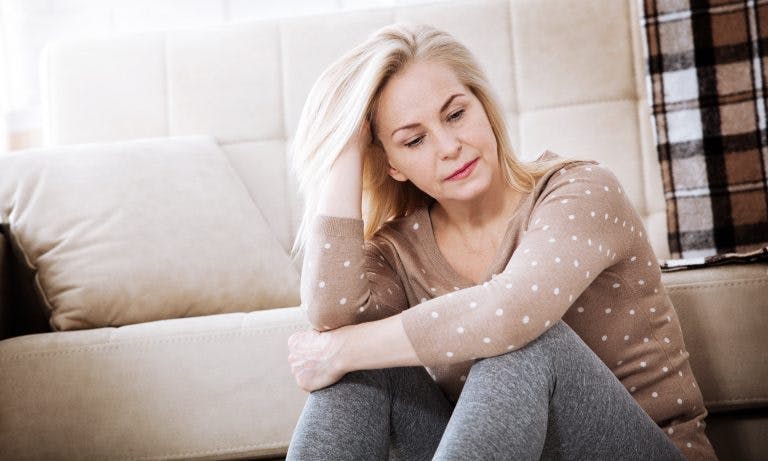Reviewed by Physician Anita Pee and Dr Angelica L Dumapit
What Are The Signs Of Early Menopause?
Published | 7 min read
Learn how to identify the signs of early menopause and what you can do to feel more comfortable during this time.
Menopause is a natural phase of a woman’s life. In the United States, 51 is the average age that it occurs. However, when it happens before age 45, it is considered early menopause. If you think that you’re experiencing signs of early menopause, it is important to work with your gynecologist to make sure it is not the result of an undiagnosed medical condition or a trigger for future health problems.
The symptoms of perimenopause (the months or years leading up to menopause) can be unpleasant. Fortunately, there are treatments such as hormone replacement therapy (HRT) and herbal remedies that can help you feel more comfortable. Keep reading to find out more about the causes, the signs of early menopause, and how Traditional Chinese Medicine (TCM) and Western medicine can help you through your transition.
Causes And Symptoms Of Early Menopause
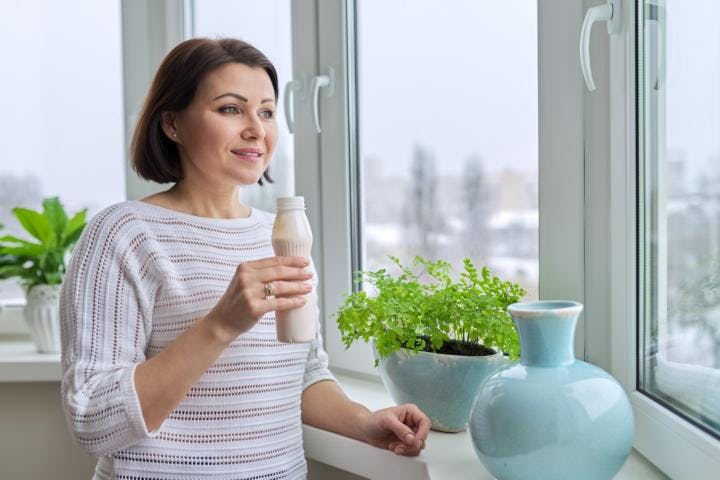
There may be no known cause of premature menopause. However, it has been reported that it may be the result of a medical condition or treatment, such as chemotherapy, hysterectomy, or oophorectomy. It may also be genetic. Women who have had a hysterectomy or had their ovaries removed before age 45 may experience it as well. Some other risk factors for early menopause include:
- Being a smoker
- A family history of early menopause
- Having certain medical conditions: chromosomal abnormalities (Fragile X and Turner’s syndrome); autoimmune diseases like rheumatoid arthritis and inflammatory bowel disease; HIV and AIDS; and certain infections, such as mumps.
TCM Physician Anita Pee suggests that if you are concerned about it, check your family history and find out if any female relatives experienced early menopause. The risks associated with early menopause include premature heart disease and osteoporosis, due to decreased estrogen levels.
If you start experiencing the signs of early menopause, your doctor will do a physical exam and bloodwork to rule out any other causes for your symptoms. If the tests reveal you have low levels of estradiol and elevated levels of follicle-stimulating hormone (FSH), it may indicate that your ovaries are starting to fail and you are entering menopause. Work with your doctor so he or she can monitor your health during and after the early transition.
Keep in mind that perimenopause officially ends when you have not had your period for 12 consecutive months. Then you have achieved menopause. Post-menopause is the phase you are then in for the rest of your life.
Let’s take a look at symptoms of perimenopause that lead up to early menopause.
Irregular Periods
This might be the first symptom you notice, especially if your period has always been regular. The average length for a menstrual cycle is about 28 days. If you are unsure if your periods are becoming irregular, there are many apps and planners available for free online that can help you keep track. It’s also important to note pain levels and the heaviness of your flow. Any changes with your period could be a sign you’re experiencing early menopause.
Hot Flashes
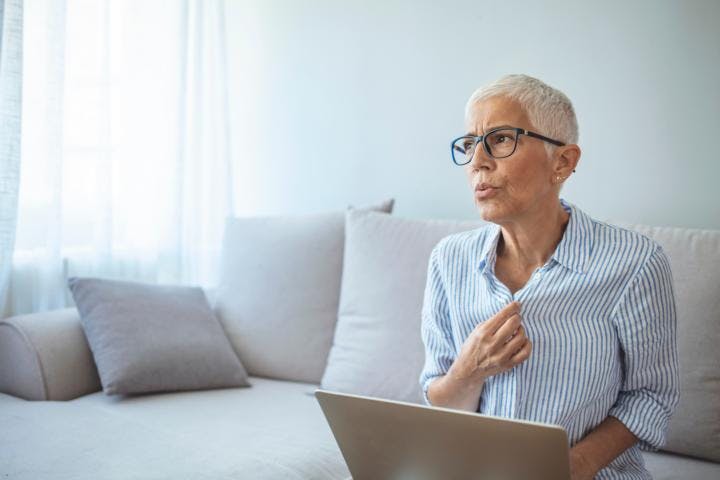
Hot flashes are one of the more uncomfortable signs of menopause. Fluctuating hormone levels cause your hypothalamus, the gland responsible for temperature regulation, to react more aggressively to slight changes. While hot flashes aren’t inherently dangerous, they can make you uncomfortable during the day and interfere with your sleep.
Hormone replacement therapy (HRT) using estrogen and progesterone/progestin can ease hot flashes. There are also TCM remedies that can help. Physician Pee recommends making porridge with 10g each of lily bulb and Lotus seed. The porridge helps to nourish yin and calm the mind, as well as helps with dry skin.
Night Sweats
Hot flashes bring about night sweats. If your sleep is interrupted by night sweats, here are a few adjustments you can make:
- Use layered bedding that can be removed as needed throughout the night
- Wear loose-fitting, lightweight pajamas in a material like cotton or bamboo
- Have a fan and cold water easily available
- Avoid triggers like alcohol, spicy foods, and caffeine
Mood Changes
Experiencing a wide array of emotions is part of being human, but the hormone fluctuations associated with early menopause make those emotional shifts feel more intense.
Irritability is one of the top complaints reported by perimenopausal women. This feeling may also be a result of interrupted sleep and other physical symptoms. You may also experience depression, anxiety, and sadness more often.
Dryness
In addition to all of the other changes you go through during perimenopause and menopause, you may notice a difference in your skin. Lower levels of estrogen make the skin thinner and you produce less sebum, the oily substance that keeps skin lubricated. You may also experience vaginal dryness, which can lead to pain during sex. A water-based lubricant is recommended. If you aren’t finding enough relief, your doctor might prescribe a topical estrogen cream to help reinvigorate vaginal tissues.
For your dry skin, you may have to make changes to your beauty routine. A gentle cleanser is recommended, as well as frequent moisturizing. Avoid harsh exfoliants, they may damage thinning skin.
Difficulty Concentrating
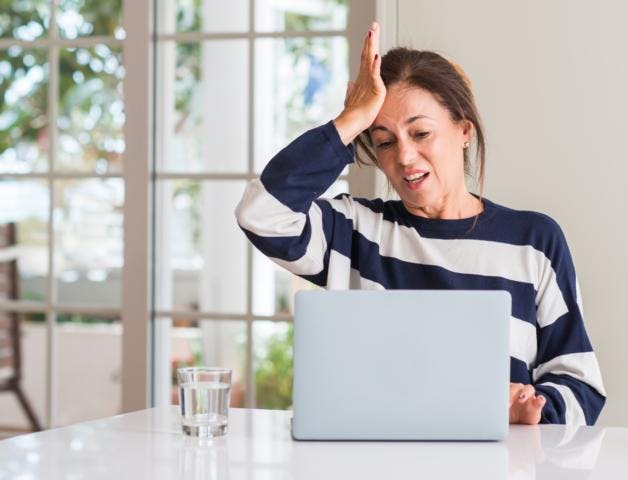
Difficulty concentrating can be the result of stress or hormonal fluctuations associated with perimenopause. Keep a foggy brain at bay by getting plenty of physical exercises, mental activity, and interaction with others. Physician Pee recommends gentle exercise like Tai Chi. HRT can also help enormously.
Difficulty Sleeping
In addition to sleep disruptions from hot flashes and night sweats, you may also experience insomnia. Why? It is thought that menopause-associated lower levels of estradiol and melatonin can cause sleep disturbances. Mental health can also play a part in insomnia. Menopause is a big transition and can signal the start of a new phase of life, which can cause emotional as well as physical changes. Physician Pee says that “acupuncture is especially helpful for symptoms like depression, anxiety, and insomnia, as it relaxes the body and calms the mind.”
How TCM Can Help Alleviate Symptoms Of Early Menopause
For thousands of years, women have found relief from their menopause symptoms with TCM treatments. Physician Pee “uses a combination of herbal medicine and acupuncture to manage menopausal symptoms and to invigorate qi (vital energy) and blood.”
It’s best to consult a TCM doctor to determine the right treatment formula for you. TCM diagnosis is through pulse-taking and inquiry of medical history and current symptoms. Typically, if a woman is over the age of 45, is experiencing shorter, infrequent periods, and is having symptoms such as hot flashes, mood swings, insomnia, body aches, and dryness, she is most likely in premenopause. Certain pulse types can show Yin deficiency and kidney deficiency which can appear in women nearing menopause, however, it is not a definitive method of diagnosis. In such cases, it will be ideal to obtain blood work to be sure. But there are things you can do at home to help alleviate hot flashes and regulate your mood. Try brewing some tea! Here’s a recipe from Physician Pee:
- 3g Chrysanthemum
- 3g Rosebuds
- 10g Goji berries
Use a suitable amount of hot water and steep for 10 minutes. Drink throughout the day to help with anxiety and irritability.
You can also alleviate early menopause and menopause symptoms by taking Menoease Pills. In addition to relieving the menopause symptoms, the herbal remedy consisting of various Chinese herbs also has beneficial effects on the immune, digestive, and cardiovascular systems.
Acupressure
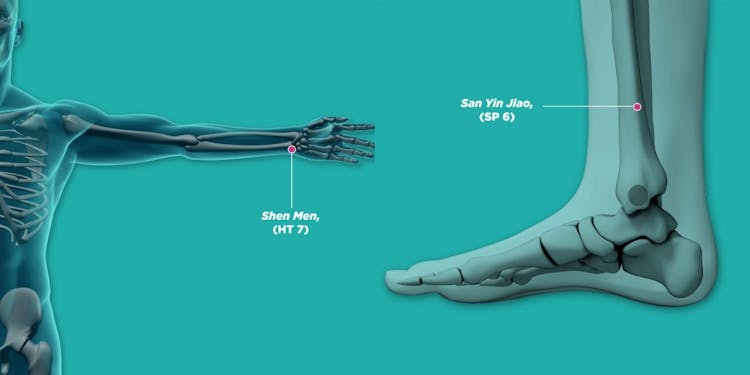
You can also try acupressure. At home, massage each of these points for 3 to 5 minutes throughout the day.
Shen Men (HT7)
This point is located on the inner wrist crease on the radial side of the tendon of flexor carpi ulnaris, or in simpler terms, the tendon on the side of the little finger. It’s great for calming the mind and relieving anxiety, insomnia, and heart palpitations.
San Yin Jiao (SP6)
This point is located 4 fingers width above the inner ankle, behind the tibia. It tonifies yin and blood and is commonly used for hot flashes, night sweats, and dryness.
Menopause is a milestone all women will go through. It’s important to remember that you’re not alone, and there may be relief from the uncomfortable symptoms you’re experiencing. If you are entering menopause early, it’s important to look at your lifestyle choices. A healthy diet, being a non-smoker, and exercise can help you avoid the diseases you are more at risk for.
If you’re experiencing any of the symptoms mentioned above, see your doctor. Save this article and bring it to your next doctor’s appointment to discuss the signs of early menopause you are experiencing.
References
- Office On Women’s Health. 2018. Early or Premature Menopause. [Accessed January 15, 2021]
- Mayo Clinic. 2020. Menopause. [Accessed January 15, 2021]
- National Institute On Aging. 2021. What Is Menopause? [Accessed January 15, 2021]
- The North American Menopause Society. Nd. Five Solutions for Menopause Symptoms. [Accessed January 15, 2021]
- National Women’s Health Network. 2017. What Options Are Available to Manage Hot Flashes? [Accessed January 16, 2021]
- American Academy of Dermatology Association. Nd. Caring For Your Skin In Menopause. [Accessed January 16, 2021]
- Mayo Clinic. Menopause. [Accessed February 18, 2022]
Share this article on

